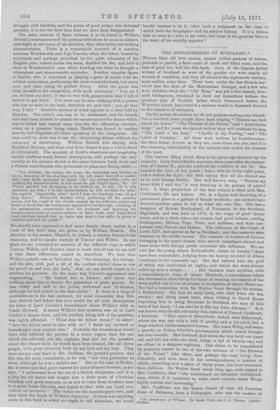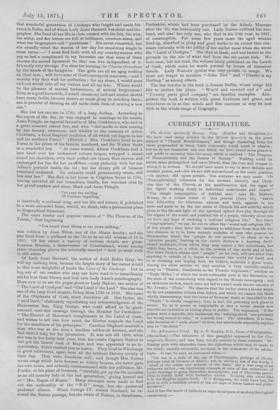THE SONGSTRESSES OF SCOTLAND.*
Wiese likes old love stories, quaint yellow packets of letters, portraits in pastile, a faint scent of musk and dried roses, and the best of good wit, will like this book. Such of the famous ballad writers of Scotland as were of the gentler sex were nearly all women of condition, and they all adorned the eighteenth century, some earlier, some later. Those born under the last Stuarts sur- vived into the days of the Hanoverian Georges, and a few who were children.when the " Old King " was yet a fair-haired, blue- eyed bridegroom, remained to show our immediate fathers the gracious type of Scottish ladies which blossomed before the Waverley novels had created a modern world in-Scotland devoted to the romance of antiquity.
On the poems themselves we do not purpose making any remark.
For a hundred years people have been singing " There's nee luck about the house," "'The Flowers of the Forest," and " Auld Robin Gray ;" and for years we cannot reckon they will continue to sing "The Land o' the Leal," " Charlie is my Darling," and "The Laird of Cockpen." All these were written by Scotchwornen ; the three latter, diverse as they are, came from one pen, and it is the charming individuality of the authors that makes the interest of the book.
One curious thing about them is the great age attained by the majority. Lady Grisel liaillie was born three years after the restora- tion of Charles II., and she outlived the rebellion of the '45. She married the love of her youth ; was a wife for forty-eight years, and a widow for eight ; she died saying that all she desired was to bo with George Baillio. Her well-known song, " 1Verena my heart Licht I wad dee," is very touching in its picture of parted
love. A large proportion of the first volume is filled with Mrs. Cockburn's life and letters. She is a figure well deserving of a permanent place in a gallery of female worthies ; our authors have devoted peculiar pains to tell us what she was like. She was a daughter of Robert Rutherford, of Fairnalee, in the Southern Highlands, and was born in 1712, in the reign of good Queen Anne, and in a circle where the women had good culture, reading Shakespeare, Milton, Pope, Prior, and Addison, and wore con- versant with French and Italian. The influence of the Court of Louis XIV. had spread as far as Scotland ; and fine manners were common in the border homes. The number of soldiers of fortune belonging to the upper classes who served campaigns abroad and came home with foreign polish increased this influence. We are told that the young Alison Rutherford's claims to beauty " must have been remarkable, judging from the beauty recorded of Alison Cockburn in her venerable ago. She had auburn hair, the gold of which was unsilvered at eighty, and which she wore always
rolled up over a toupee Her features were aquiline, with a resemblance to those of Queen Elizabeth, a resemblance which she increased in after life by her fancy of wearing the sleeves of her dress puffed out at the shoulders in the fashion of Queen Bess's era. She had a cousiuship with Sir Walter Scott through his mother, a Rutherford. She had an early lover, who died when she was twenty ; and thirty years later, when writing to David Hume imploring him to bring Rousseau to Scotland, she says of this hero of her fancy, ' I am sure he is like my John Aikinan.' " It is not known why she did not marry him, instead of Patrick Cockburn, a barrister. " Her name is thenceforth linked with Edinburgh, where she was not only a lady of quality and a bel esprit, but a large-hearted, blithe-tempered woman. She was a Whig, and wrote a parody on Prince Charlie's proclamation which nearly brought her into trouble. Her husband died when she was forty-one years old, and left her with one child, Adam, a lad of twenty-one, and an officer in a dragoon regiment. Her claims to be remembered by posterity consist in one of the two versions of "The Flowers of the Forest " (the other, and perhaps the best, being Jean Elliott's), and even more in her correspondence, a portion of which, extending over a space of thirty years, has been recovered from oblivion. Sir Walter Scott wrote long ago, with regard to Mrs. Cockburn, that "she maintained an extensive correspond- ence, which, if it continues to exist, must contain many things highly curious and interesting."
Mrs. Cockburn was the bosom friend of that old Countess Anne of Be.learres, born a Dalrymple, who was the mother of
"The Songstresses of 40tlanel. By (Sarah Tytior and J. L. Watson. London McMinn.
that wonderful generation of Liudsays who fought and made for- tunes in India, and of whom Lady Anne Barnard was sister and bio- grapher. She lived all her life in close contact with the fair, the wise, the witty, and her letters are full of brilliance, common-sense, and what her biographers call " pawkiness." She never remarried, but she soundly rated the women of her day for remaining single in these terms :—" I must find fault with all my countrywomen who pay so bad a compliment to my favourite sex that none of them chooses the sacred hymeneal tie that can live independent of it. It's really very strange. I'm clear for burning Sir Charles Grandison by the hands of the hangman. The girls are all set agog seeking an ideal man ; will have none of God's corrupted creatures,—and I wonder why they wish for perfection ; for my share, I would none on't—it would ruin all my virtues and all my love. Where would be the pleasure of mutual forbearance, of mutual forgiveness? Even as a good housewife, I would choose my lord and master should have many faults, because there's so much glory in mending them; one is prouder of darning an old table-cloth than of sewing a new one."
She lost her one son in 1780, of a long decline. According to the report of the day, he was engaged in marriage to his cousin, Anne Pringle, an especial favourite of Mrs. Cockburn's, who had in a great measure reared her, and who "did credit to that rearing by her beauty, sweetness, and fidelity to the memory of Adam Cockburn, a faint fragrant tradition of all which yet lingers in her and his mother's Forest." (Ettrick.) Mrs. Cockburn lived to see Burns in the prime of his fatuous manhood, and Sir Walter Scott as a wonderful boy. " As years waned, Alison Cockburn tied a lace hood over her undimmed auburn toupee, wrapped a shawl round her shoulders, with their puffed-out queen Bess sleeves, and exchanged her fan for her suuffJbox —very probably with her son Adam's portrait inside the lid ; but her cheery gift of humour remained unabated. No calamity could permanently crush, still less sour her." She died iu her house in Crighton Street in 1794, having survived all her immediate family, but watched over by her grand-nephew and niece, Mark and Anne Priugle.
I've seen the smiling Of Fortune beguiling," is deservedly a national song, and her life and letters, if published in a wore extended form, would, we think, take a permanent place in biographical literature.
The more tender and popular version of " The Flowers of the Forest," that beginning "I've heard them lilting at our yowe-milking,"
was written by Jean Elliot, one of the Minto family ; and she also lived from a girlhood in the '45 to be an old woman of 78 in 1805. Of her career a variety of curious details are given. Susanna Blamire, a dalesworaan of Cumberland, wrote among other charming pieces the musically married " And ye shall walk in silk attire."
Of Lady Anne Barnard, the author of Auld Robin Gray, we will say nothing here, because the bright story of her career is told in that most delightful of books the Lives of the Liudsays. Let us beg any of our readers who may not have read it to immediately ask for it at their library and look into Lady Anne's autobiography. More new to us are the pages given to Lady Nairne, the author of " The Laird of Cockpen" and "The Land o' the Leal." She also was one of the long-lived singers, living from 1766 to 1845. She came of the Oliphants of Gask, stout Jacobites all. Her father, the " auld laird," obstinately repudiating any acknowledgment of the Hanoverian line, King George, who could afford to be good- natured, sent this message through the Member for Perthshire : " The Elector of Hanover's compliments to the Laird of Gask, and wishes to tell him how much the Elector respects the Laird for the steadiness of his principles." Caroline Oliphant married a man who was at the time a landless soldier of fortune, and she had waited long for his promotion. It was not till 1806, when she was in her forty-first year, that her cousin Captain Nairne at last got the brevet rank of Major, and was appointed to an in- spectorship, which enabled him to marry. They lived in Edinburgh iu great retirement, apart from all the brilliant literary society of their day. They were Jacobites still ; and though Mrs. Nairne wrote songs which have become so widely famous, she never gave her own name, and actually communicated with her publisher, Mr. purdie, at his place of business, " carefully got up for the occasion as au old country lady of the last generation," giving herself out as " Mrs. Began of Bogan." Many attempts were made to find out the authorship of the " B B " songs, but she preserved profound silence. When George IV. visited Scotland, lie re- stored the Nairne peerage, but the estate of Nairne, in Strathearn, Perthshire, which had been purchased by the Athole Murrays after the '45, was irrevocably lost. Lady Nairne outlived her hue- band, and alas'. her only son, who died in his 30th year, in 1837, of consumption. For some few years more the aged woman lived op, absorbed in piety and good works to an extent that con- trasts curiously with the jollity of her earlier muse when she wrote the " Laird of Cockpen." She died at Gask, and was buried in the grounds on the site of what had been the old parish kirk. We have seen, but not read, the volume lately published on the Lairds of Gask, which must be worth perusal by lovers of historical details. Lady Nairne's genius was very prolific in songs. We must not forget to mention " John Tod " and " Charlie is my Darling," as among others.
The last heroine in the book is Jeanne Bernie, whose songs bid fair to outlive her plays. " Woo'd and married and a'" and " Poverty parts good company" are familiar examples. Alto- gether, the book is written with great liveliness and grace, and introduces us to as fine minds and fine manners as may be met with in the whole range of biography.































 Previous page
Previous page